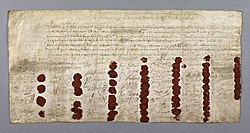John Hewson | |
|---|---|
 Death warrant of Charles I; Hewson's signature is bottom of the third column from the left | |
| Committee of Safety | |
| In office October 1659 – December 1659 | |
| Member of Parliament for Guildford | |
| In office September 1656 – January 1658 | |
| Member of Parliament for County Dublin | |
| In office September 1654 – January 1655 | |
| Nominated to Barebones Parliament as MP for Ireland | |
| In office July 1653 – December 1653 | |
| Governor of Dublin, Ireland | |
| In office September 1649 – October 1656 | |
| Personal details | |
| Born | Unknown [a] London, England |
| Died | 1662 Amsterdam, possibly Rouen |
| Spouse(s) | Twice married, unknown |
| Children | Possibly three sons |
| Occupation | Shoemaker, soldier, politician and religious radical |
| Military service | |
| Allegiance | Parliamentarian |
| Years of service | 1642–1659 |
| Rank | Colonel |
| Battles/wars | |
Colonel John Hewson, also spelt Hughson (died 1662), was a shoemaker from London and religious Independent who fought for Parliament and the Commonwealth in the Wars of the Three Kingdoms, reaching the rank of colonel. Considered one of Oliver Cromwell's most reliable supporters within the New Model Army, his unit played a prominent part in Pride's Purge of December 1648. Hewson signed the death warrant for the Execution of Charles I in January 1649, for which he reportedly sourced the headsman, while soldiers from his regiment provided security.
During the 1649 to 1660 Interregnum, he served as Governor of Dublin and MP for County Dublin until 1656. He then returned to England and was MP for Guildford before being elevated to Cromwell's Other House in 1658. As one of the surviving Regicides of Charles I, he was exempted from the Indemnity and Oblivion Act after the 1660 Stuart Restoration. He went into exile in the Dutch Republic, and is thought to have died in Amsterdam in 1662.
- ^ Wallis 2019, pp. 247–281.
Cite error: There are <ref group=lower-alpha> tags or {{efn}} templates on this page, but the references will not show without a {{reflist|group=lower-alpha}} template or {{notelist}} template (see the help page).